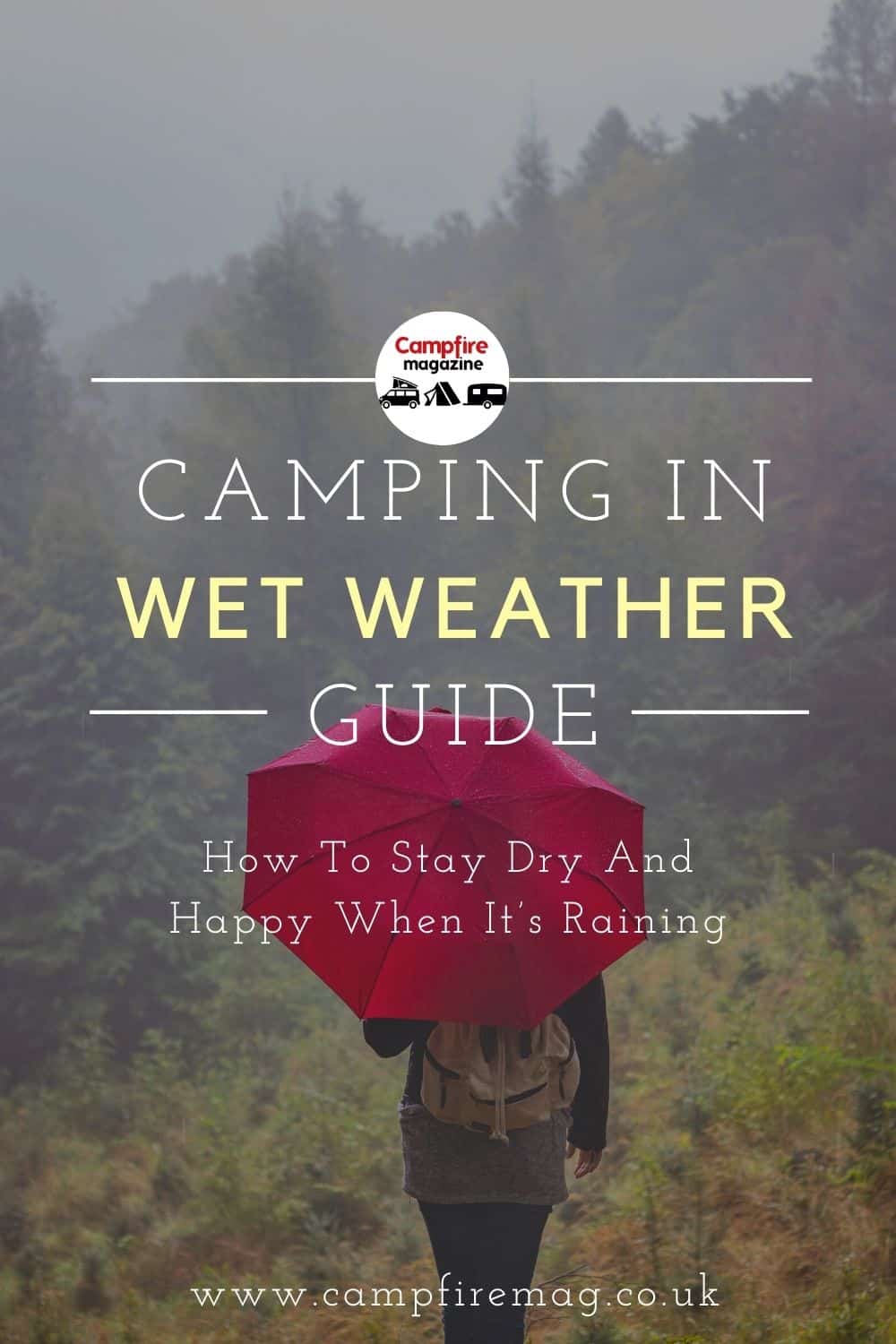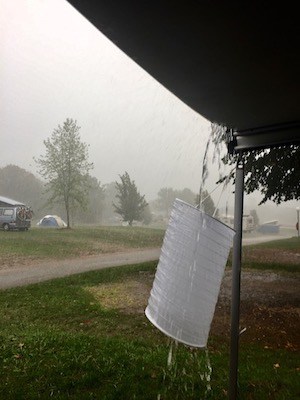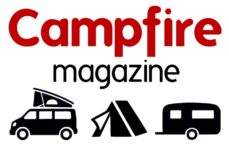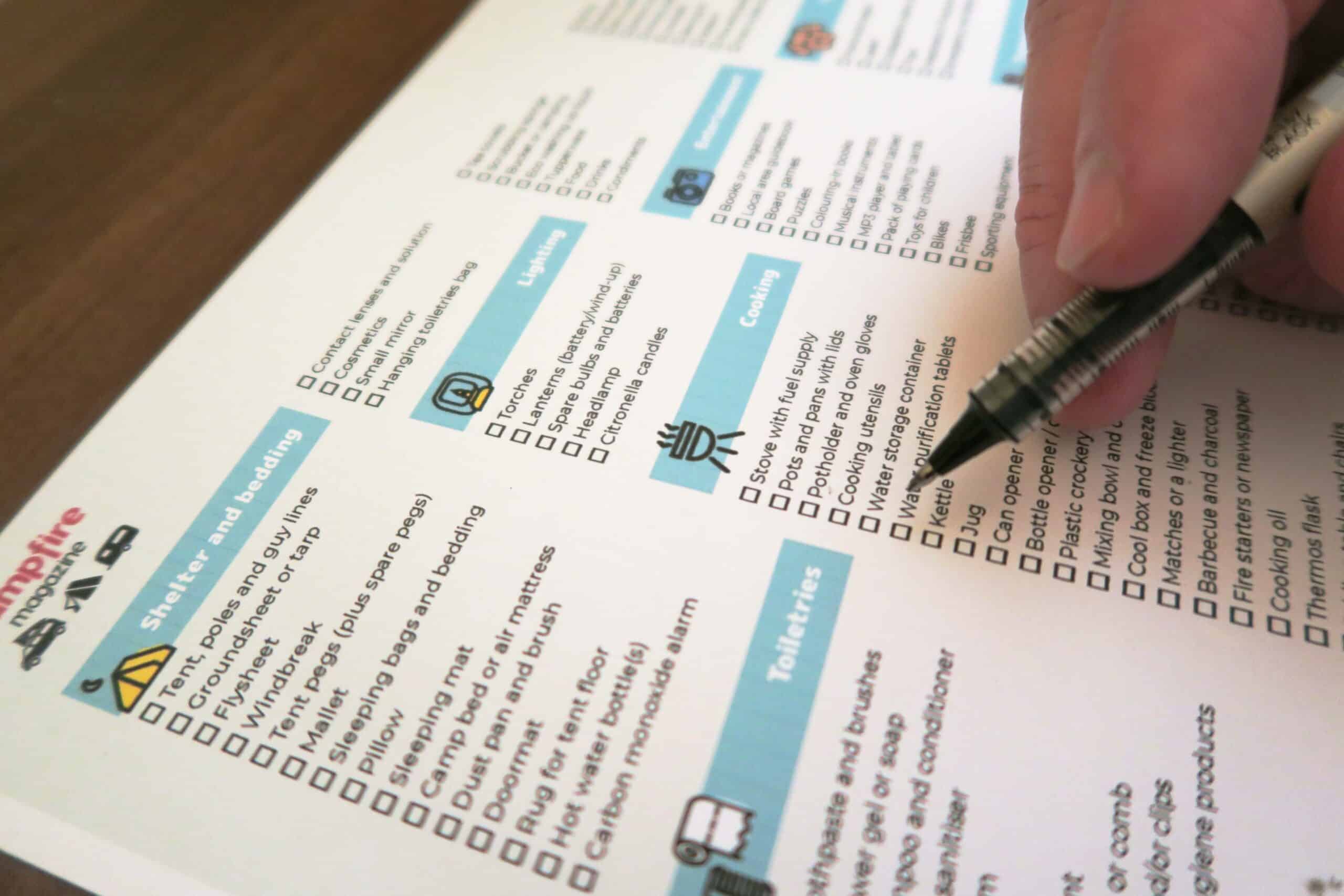When we plan camping trips, it’s always in the hope of blue skies.
If you prepare for rain and chilly days, though, you can extend your camping season…and stay comfortable.
Here’s our guide to making the most of being outdoors in a tent, campervan or caravan…whatever the weather.
All our reviews at Campfire Magazine are independent and honest.

In a hurry? If you don’t have much time using the links below to quickly find our favourite wet weather items for you on Amazon and beyond. You can be assured we only choose the best products…
Setting up camp in the rain
If you’ve been checking the forecast before you go, you’ll have a sense of what to expect and you can prepare.
Often, though, you might arrive in sunshine and get a surprise soaking. Here are some tips for choosing your pitch and setting up if it’s raining or if rain threatens.
Look at the rain running off that SOLAR light! The awning and tarp are keeping us dry, though.

Skip to the loos
Choose a pitch fairly close to the toilets. It can get pretty miserable putting on jackets and wellies every time you want to go to the loo, have a shower or do some washing up.
Make it easier by not having far to go. Having your own toilet is handy too. We’ve got some recommendations for portable camping toilets that will take up no space at all.
Don’t pitch in a ditch
You obviously won’t camp in a dip that could collect rainwater…that goes without saying, but flat ground isn’t great either.

In this picture, the hill gives some protection. Just as well. That blue sky didn’t last for long!
The best is a very slight slope and your door positioned facing downhill. Is there somewhere with natural shelter – like in the lee of a wall? Trees are good cover, but water will drip on you long after the rain has stopped.

Trees for shelter, but a tarp to keep the rain off.
The magic of tarps and shelters
If it’s raining when you arrive, wait for a break in the clouds or create a quick protected spot with a tarpaulin to keep your camping gear dry while you set up.
It may seem a bit obsessive, but practise a tarp set-up ready for these occasions. It makes a big difference if you don’t have to fumble with poles and guy ropes because you know exactly how to pitch the tarp.
You can find more in our tarp article. Use tarp as extra cover for a tent or as an awning/extension for a campervan or caravan. Use it to cover bikes or create a cooking area. Take adaptable tarp poles to make it easy whatever the situation.
A quick erect gazebo or shelter is great for wet conditions. Throw it up in a couple of minutes to make pitching your tent or unpacking more comfortable. For the rest of your stay, you’ve then also got extra dry space and a cooking area your tent or campervan is all set-up. Lots of recommendations in our multipurpose shelter article.

Not sure which shelter this is, but it looks like the Coleman Event Shelters. They come with optional sides too.
Tarps are versatile and give sun and rain shelter.
The Unigear tarp poles are the best we’ve found. They’ll give you between 40 and 240cm of height and are made with lightweight (800g in total) but strong aircraft aluminium. They also have some good bits of design to add strength and make it easier to set up.
Umbrellas for shelter?
One of our readers told us they used a fishing brolly instead of a tarp. It’s a great tip.
We like the NGT Carp Fishing brolly (we even have a soft spot for the camoflague colourway!)Here’s a non-fishing option. The SportBrella has side flaps, side protection and a 50 UV rating.
Know your tent or campervan inside-out
If you know exactly what you’re doing, pitching or setting up will be faster and you’ll be inside and warm in a twinkling.

You do not want to be grappling with a monster just as the heavens open. Practise!
So, practise if you haven’t already learnt the ins and outs of your equipment.
If you’re in a tent, the outside fabric should be tight, by the way, so use pegs and guys. This will ensure it doesn’t flap around in the wind and makes it as waterproof as possible.
Sealing yourself in against the elements is sensible, of course, but it can also lead to condensation. Give yourself some ventilation and keep a soft cloth around to wipe away condensation before it soaks sleeping bags or clothes.
TOP TIP: Remember to guy tarps with elasticated or bungee rope so that they don’t get carried off in a wind.
Clever packing
Use drybags, ziploc bags or packing cubes to pack clothes, food and bits and pieces.
The Karrimor drybags come in lots of sizes and a very affordable. Or go for transparent drybags so you can see what’s inside.
It’s much easier to keep wet things away from dry this way. Take bin bags for bigger pieces of camping equipment like a tent or awning.
Packing cubes satisfy the obsessive organiser in me!
If your tent, awning or camping gear is wet when it’s time to pack up, don’t worry too much. If you’re going straight home, you can dry things out when you get back.
Don’t leave damp camping equipment folded up for too long, though, or it’ll get smelly and could even start to rot.
Clothes for wet weather camping
It goes without saying – you need a good raincoat, walking jacket/anorak or poncho
The best rainwear is breathable and quick-drying. Ponchos are useful because you can often fit your rucksack underneath as well as yourself.We like these Vaude Valero ponchos with sleeves. They come in a range of sizes (ponchos often are one-size only that swamps smaller folk).
Decathlon has a great range of ponchos too, like this £18 poncho that can fit your backpack underneath. Remember get a poncho, as we are often asked are windbreakers waterproof?
The Rubbastuff poncho
I've been testing the Rubbastuff Pacmat poncho on some wild walks with my step-mum.
This poncho is pretty perfect. Waterproof, soft inside, straps to keep it attached to bike handlebars or a pram handle, rolls up small, nice colours and you can spread it out for a picnic mat. Great.
You can stash your rucksack underneath, there are reflective bits for night-time…oh, and the hood works. It’s very adjustable and has a peak.
Shoes
Shoes are going to be on and off all the time. Wellies are the cheapest and most obvious wet weather footwear, but they’re not always easy to slip into.Favourites are these lightweight neoprene Dirt Boots in men’s and women’s sizes.
We like waterproof gardening shoes or clogs for quick trips to the showers because they’re a lot easier to get into and lighter too. Don’t get the rubber ones – way too heavy.
Lots of colours and sizes in these backless Briers clogs. They are cheap too.
Toffeln professional quality clogs and shoes are brilliant
Lightweight, waterproof, proper insoles and non-slip grips. Go for the higher-back clogs with back strap or the closed shoe. Both easy to get on, but won’t slip off your feet half-way to the toilet block. Cheaper and way better than Crocs. Oh, and men’s and women’s sizes plus lots of colours.
Waterproof trousers
Waterproof trousers are good for hiking in the rain, but a bit of a pain when camping.
Unless you get some that are easy to put on, you’ll get soaked struggling into and out of them.
Mountain Warehouse waterproofs are available for men and women and don’t cost very much at all.
Or have a look at Decathlon for both overtrousers and for waterproofs that work well for running, cycling or climbing.
Regatta also have a big choice of affordable overtrousers, as well as water-repellent walking trousers for men and women.
Quick-drying is easier
A better solution is to take a couple of pairs of quick-drying trousers, like these smart-looking Craghopper Kiwi Pros, to change into.
And, if you can bear it, wear shorts because legs dry faster than anything!
If your outdoor clothes have lost some of their water-resistance, you can reproof them either in the washing machine or by hand.
We use Nikwax, but there are others too.
QUICK TIP
A waterproof hat will make you feel invincible…really! There’s a huge range at Outdoor Gear and even more options at Sportshoes, who sell the fantastic Sealskinz range. Those, and the waterproof Dexshell beanies are our favourites for keeping the rain off.
Take lots more socks than you can imagine ever needing! Our favourites are Darn Tough and Horizon – both designed to last for years and very comfortable.
Just found….Rite in the Rain notebooks
Brilliant and HUGE range of notebooks and journals that you can write on even when they’re wet.
Hard and soft covers, all sizes, even printing paper. Affordable and recyclable too. Now you can write your novel while camping in the rain.
Keeping warm
If it’s going to be both wet and cold, have a look at these articles….
- Camping in winter – lots of information on how to stay cosy.
- Our guide to campervan heaters – including best buys for portable electric heaters, portable gas heaters, blown-air parking heaters and more.
- Our guide to fire pit on decking
- Our guide to camping fire pits
- We also have been asked what to bring to a bonfire party so we wrote about that too
Campsite cooking in the rain
Cooking in the rain and wind can be a real challenge. This is where good organisation pays off.
Have all your food in ziploc bags or boxes, know where everything is and it’ll all seem a lot more fun!
Remember that it’s not safe to use a gas stove inside a tent or sealed-up campervan. You need very good ventilation. Use your awning or tarp shelter instead.
It’s one of the reasons we love using an induction hob like the one shown when we’re on hook-up. There are lots of other suggestions in our electric camping stove article.
Outside in a gazebo, awning or tarp shelter, you’re going to need a decent windshield for your gas stove. They’re cheap to buy, but will save you frustration and mean you burn less gas.
BUT, if struggling is going to spoil your enjoyment of the rest of your stay, don’t feel you’ve failed if you escape to the pub or use some of our tasty cheats – bought-in meals that need barely any preparation but are FAR better than a pot noodle!

Firepot freeze-dried meals (for the two nights after pole-lathing when we were too exhausted to cook). All-natural and plenty in the pouch.
Games
Stuck indoors – never bored
Playing cards, a portable chess set, travel games, plenty of books, maybe audiobooks on your phone or iPad (with headphones so you don’t annoy neighbours).
And how about using the time for something you’ve been meaning to do? Some sketching in a nice new notebook, working out the plot of your novel…even reading the paper cover to cover for once.
Here are some games we like that don’t take up much room.
Abalone is our current favourite game for two. Simple to learn, tactile, strategic, portable.
You simply aim to push six of your opponent’s pieces off the board by moving one, two or three of your own marbles. Sounds easy, but there are endless challenges and ways to improve your play. There are even tournaments…but we’re a long way from that!
Catan – a lovely game involving building roads and settlements. Two to four players, kids and adults.
Dobble is a game of speed, observation and reflexes. Find matching images on the special cards. It’s harder than it looks!
Backpacker - A travel travel game! Very meta. A card-based game for two to six players.
Accentuate - Can you say “Open the bomb bay doors, Hal?” in a Swedish accent. You’ll soon find out you don’t know your Mumbai from your Mevagissey with this hilarious game of Accentuate for four or more.
Yahtzee - Good old Yahtzee. So addictive I’ve been known to invent a solo game! Just five dice and scorecards, so super-portable.
Rummikub - It’s a bit like gin rummy with tiles and a good choice if all the word-based games aren’t your thing. If you get the travel version, you can take it on your next trip.
Travel Monopoly - Card-stealing fun in a handy travel size.
A nice mini-sized version of the fast-talking description game, Articulate. Great fun. For two or more players,.
Now this is interesting! Try to get your team to choose the right words by finding a connecting idea. Hard to explain, but easy-yet-compelling to play. There are lots of editions of Codenames too, including a Disney and a Marvel version.
Sussed - A fun conversation and personality game with lots of twists and opportunities for hilarity. For two players or more.
Nothing beats cards
And, of course, just a simple pack of cards (and a folding cribbage board)…oh, and a chess set. We wrote an article about Best Camping Games to play on your next trip, should you need more ideas.





























![Hasbro Gaming Yahtzee Dice Game [Amazon Exclusive]](https://m.media-amazon.com/images/I/61Bdk7gTdeL._SL160_.jpg)






